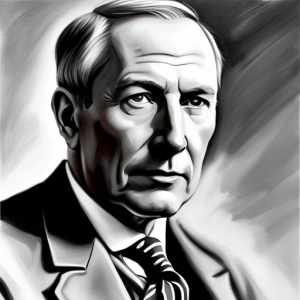John Bogle: The Father of Index Funds

John Bogle was an American investor, business magnate, and philanthropist who founded The Vanguard Group. He was a major figure in the investment community, credited with popularizing the index fund and advocating for investment over speculation. Bogle was known for his long-term patience and believed that buying a low-cost index fund and holding it forever was the optimal strategy for the majority of investors.
Bogle’s impact on the investment world was significant, particularly in his efforts to make investing accessible to the average person. He was the first person to offer an index fund to retail customers, and his creation of the world’s first retail index mutual fund revolutionized the industry. Bogle’s investment philosophy was grounded in the idea that investors should focus on the long-term and avoid the temptation to chase short-term gains. He believed that low-cost index funds were the best way to achieve long-term success in the stock market.
Bogle’s legacy continues to influence the investment world, and his timeless investment lessons remain relevant today. In this article, we will delve deeper into Bogle’s life and work, exploring his investment philosophy and the impact he had on the investment industry. We will examine his investment strategies and explore the lessons that investors can learn from his approach to investing.
Early Life and Career
John Bogle was born on May 8, 1929, in Montclair, New Jersey, to William Yates Bogle, Jr. and Josephine Lorraine Hipkins. He graduated from Blair Academy in 1947 and went on to study at Princeton University, where he earned a degree in Economics in 1951.
After graduation, Bogle started his career at the Wellington Fund, where he was hired by company founder Walter Morgan. In 1967, Bogle became the CEO of Wellington Fund, but he was fired from the company in 1974 due to a dispute with the board of directors.
After leaving Wellington, Bogle founded the Vanguard Group in 1975. He introduced the first index fund for individual investors, the Vanguard 500 Index Fund, which was designed to track the performance of the S&P 500 index. Bogle’s investment philosophy was based on the idea of low-cost, passive investing, which he believed was the key to long-term financial success.
Bogle’s investment philosophy was revolutionary at the time, as most investors were focused on active management and high fees. Bogle believed that investors could achieve better returns by investing in low-cost index funds, which would provide broad market exposure without the high fees associated with active management.
Overall, Bogle’s early life and career laid the foundation for his revolutionary investment philosophy, which would go on to change the investment industry forever. His focus on low-cost, passive investing continues to be a guiding principle for investors today, and his legacy as the founder of the Vanguard Group remains a testament to his vision and leadership.
The Birth of Index Funds
John Bogle, the founder of The Vanguard Group, is widely credited with popularizing the index fund and changing the investment world forever. In 1976, Bogle launched the first-ever index mutual fund, the First Index Investment Trust, which later became the Vanguard 500 Index Fund. This fund aimed to track the performance of the S&P 500 index, a market index that represents the largest 500 companies in the United States.
At the time, the mutual fund industry was dominated by actively managed funds, which aimed to outperform the market by selecting individual stocks and timing the market. These funds charged high fees and expenses, which ate away at investors’ returns. Bogle believed that most investors would be better off investing in low-cost index funds that simply aimed to match the market’s performance.
Bogle’s idea was initially met with skepticism and even derision. Many in the investment industry dismissed the idea of index funds as “un-American” and a “sure path to mediocrity.” However, Bogle persisted, and his index fund gradually gained popularity among investors who were fed up with high fees and poor performance from actively managed funds.
Today, index funds are a staple of the investment world, with trillions of dollars invested in them. They are widely recognized as a low-cost, effective way for investors to gain exposure to the market and achieve long-term returns. In fact, many studies have shown that index funds outperform the majority of actively managed funds over the long term, due in large part to their low fees and expenses.
In summary, John Bogle’s creation of the index fund was a revolutionary development in the investment world. It challenged the dominance of actively managed funds and introduced a low-cost, effective alternative for investors. Today, index funds are a cornerstone of many investors’ portfolios, and Bogle’s legacy continues to influence the investment industry.
Champion of Low-Cost Investing
John Bogle was a champion of low-cost investing, and his legacy continues to influence the investment world today. He believed that high fees and expenses are the biggest enemies of investors, and that minimizing costs is a crucial factor in achieving long-term investment success.
Bogle’s philosophy was based on the idea that most investors are better off investing in low-cost index funds rather than actively managed funds, which tend to have higher fees and expenses. He believed that by investing in a low-cost index fund and holding it for the long term, investors could achieve market returns without the risk of underperforming the market due to high fees and expenses.
Bogle’s book, “Common Sense on Mutual Funds,” is considered a classic in the investment world and has been praised for its clear and concise explanation of the benefits of low-cost investing. In the book, Bogle argues that investors should focus on minimizing costs and that the best way to do this is by investing in index funds.
In “Common Sense on Mutual Funds: New Imperatives for the Intelligent Investor,” Bogle expands on his philosophy, emphasizing the importance of keeping investment costs low and avoiding unnecessary risks. He also provides practical advice on how to achieve long-term investment success through a low-cost, passive investment strategy.
Bogle’s ideas have been widely adopted by the investment industry, and today, low-cost index funds are a popular investment option for many investors. In fact, Bogle’s company, Vanguard, is now one of the largest investment firms in the world, with over $6 trillion in assets under management.
In his book, “The Little Book of Common Sense Investing,” Bogle provides a simple and straightforward guide to low-cost investing, outlining the benefits of index funds and offering practical advice on how to build a low-cost, diversified portfolio.
Overall, John Bogle was a passionate advocate for low-cost investing, and his ideas have had a profound impact on the investment world. His legacy continues to inspire investors to focus on minimizing costs and achieving long-term investment success through a low-cost, passive investment strategy.
Legacy and Impact
John Bogle’s legacy and impact on the financial industry cannot be overstated. He revolutionized the mutual fund industry with his creation of the first index fund, which allowed investors to buy a diversified portfolio of stocks at a low cost. His philosophy of simplicity and low fees has become a cornerstone of modern investing.
Bogle’s commitment to ethical investing and his belief in the power of long-term investing helped to shape the financial markets. He was a vocal critic of money managers who charged high fees for actively managed funds, arguing that most investors would be better off with a low-cost index fund. His message of “stay the course” encouraged investors to remain invested in the market, even during times of volatility.
One of Bogle’s lasting legacies is the Bogle Financial Markets Research Center, which he founded at Vanguard. The center conducts research into the financial markets and provides investors with valuable insights into the world of investing.
Bogle’s impact on the ETF industry cannot be ignored. He was an early advocate of ETFs, which he saw as a natural extension of his index fund philosophy. Today, ETFs are a popular investment vehicle for investors looking for low-cost, diversified exposure to the markets.
Bogle’s commitment to simplicity and low fees extended beyond equities to bond funds as well. He believed that bond funds should be just as low-cost and transparent as equity funds. Today, low-cost bond funds are widely available, thanks in part to Bogle’s influence.
Finally, Bogle’s impact on retirement planning cannot be overstated. His message of long-term investing and low fees has helped countless investors save for retirement. His commitment to ethical investing and his belief in the power of the markets to create wealth has left a lasting legacy that will continue to shape the financial industry for years to come.
The Battle for the Soul of Capitalism
John Bogle, the founder of Vanguard, wrote a book titled “The Battle for the Soul of Capitalism” in 2005. In this book, he discussed the issues that he saw with the current state of capitalism in America. He argued that the system had become corrupted and was no longer serving the best interests of investors.
Bogle criticized Wall Street for its short-term focus and its emphasis on generating profits for itself rather than for its clients. He argued that this focus had led to a lack of accountability and transparency in the financial industry. He also noted that the high fees charged by Wall Street firms were eating into the returns of investors.
Bogle also discussed the issue of inflation and how it was eroding the value of investments. He argued that investors needed to be aware of the impact of inflation on their portfolios and that they needed to take steps to protect themselves against it.
Another issue that Bogle addressed in his book was the ownership structure of corporations. He argued that the current system, where a small group of shareholders had control over the company, was not serving the best interests of all shareholders. He proposed a system where all shareholders had an equal say in the company’s decisions.
Bogle also praised Warren Buffett for his long-term focus and his emphasis on investing in a market index. He argued that this approach was a better way for investors to achieve long-term returns than trying to beat the market.
In conclusion, John Bogle’s book “The Battle for the Soul of Capitalism” is a thought-provoking critique of the current state of capitalism in America. He argues that the system has become corrupted and that it is no longer serving the best interests of investors. He proposes several solutions to these issues, including a focus on long-term investing and greater accountability and transparency in the financial industry.
Bogle’s Influence on the Investment Industry
John Bogle, the founder of Vanguard Group, revolutionized the investment industry with his innovative ideas and contributions. Bogle’s influence on the investment industry is immense, and his legacy continues to impact the industry today. Here are some of the ways Bogle has influenced the investment industry:
Index Investing
Bogle is known as the father of index investing. He believed that most mutual fund managers could not consistently outperform the market, and that the best way to invest was to buy and hold a diversified portfolio of low-cost index funds. Bogle’s idea of index investing challenged the traditional active management approach, which charged high fees and often underperformed the market.
Bogleheads
The Bogleheads are a group of investors who follow Bogle’s investment philosophy and principles. They believe in low-cost, passive investing and have created a community to share ideas and advice on investing. The Bogleheads forum and wiki are excellent resources for investors who want to learn more about Bogle’s approach to investing.
Morningstar
Morningstar, a leading investment research firm, has been a strong advocate of Bogle’s investment philosophy. Morningstar’s founder, Joe Mansueto, has credited Bogle with inspiring him to start the company. Morningstar’s rating system, which evaluates mutual funds based on their fees and performance, aligns with Bogle’s belief in low-cost, passive investing.
TD Ameritrade
TD Ameritrade, a leading online brokerage firm, has also embraced Bogle’s investment philosophy. TD Ameritrade offers a range of low-cost index funds and ETFs that align with Bogle’s approach to investing. The firm also hosts educational resources and tools to help investors get started with index investing.
Getting Started
Bogle’s approach to investing is simple and accessible to all investors. He believed that anyone could achieve financial success by following his principles of low-cost, passive investing. Bogle’s books, such as “The Little Book of Common Sense Investing,” are excellent resources for investors who want to learn more about his approach to investing.
In conclusion, John Bogle’s influence on the investment industry cannot be overstated. His innovative ideas and contributions have transformed the industry and continue to impact investors today. Bogle’s legacy lives on through the Bogleheads, Morningstar, TD Ameritrade, and countless investors who have embraced his approach to investing.
Conclusion
John Bogle was a pioneer in the investment world, and his influence is still felt today. His philosophy of low-cost, passive investing has resonated with many investors, and his legacy continues through the Vanguard Group, which he founded.
Bogle’s investment philosophy can be summed up in five key principles: save a lot, select an asset allocation containing both stock and bond asset classes, buy low-cost, widely diversified funds, allocate funds tax-efficiently, and stay the course. These principles are often referred to as the “Bogleheads investment philosophy,” and they have been embraced by many investors who seek to build long-term wealth through sound financial practices.
Bogle’s impact on the investment industry cannot be overstated. He popularized the index fund, which has become a cornerstone of many investors’ portfolios. He also advocated for reducing broker fees and other expenses, which has helped to make investing more accessible to the average person.
In addition to his contributions to the investment world, Bogle was also a philanthropist who gave generously to various causes. He believed in using his wealth to make a positive impact on the world, and his legacy extends far beyond his accomplishments in the financial realm.
Overall, John Bogle’s life and work serve as an inspiration to many. His commitment to sound financial principles, his dedication to helping others, and his unwavering integrity make him a true legend in the investment world.












